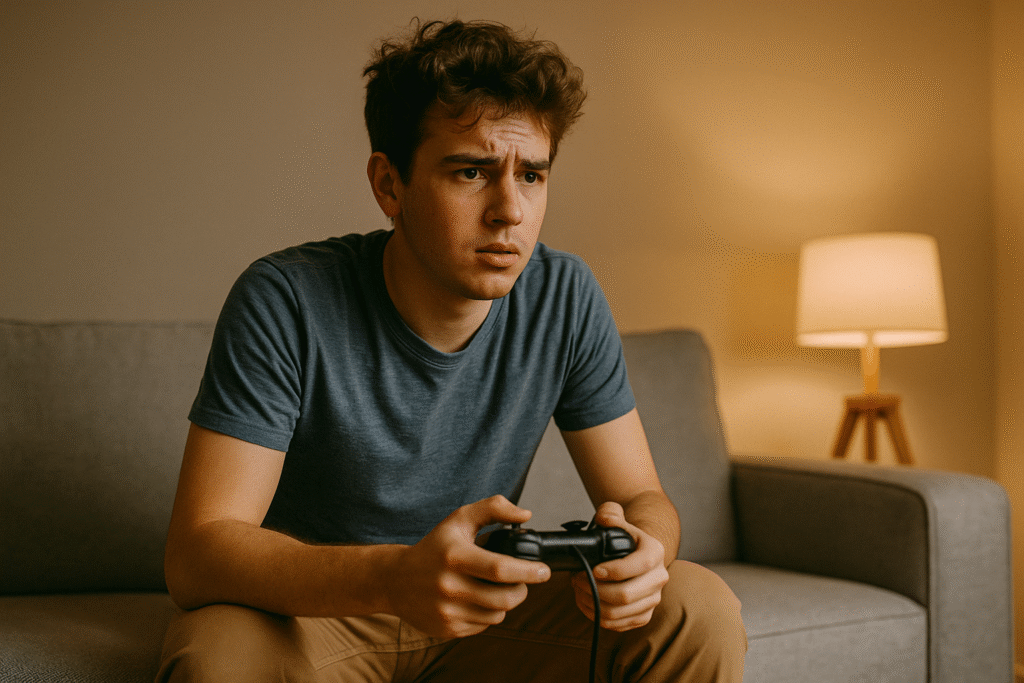
I love games. Video games, board games, even phone games. But there is a time to stop. I can’t say that I’ve ever had a video game addiction, but there have been a few times I was concerned I was developing one. Which is what we’re talking about today on Hypnotic News.
Video Game Addiction
Video game addictions are a new disorder identified by the most recent edition of the DSM. It’s a growing disorder among young people, particularly those in the Millennial generation. It’s become so serious that the World Health Organization has recognized it as a disorder and is researching possible treatments. Even the Mayo Clinic is searching for treatment options at this point.
What Is It?
So, what exactly is video game addiction? And how can hypnosis help? Well, let’s look at the effect of gaming on the brain to understand what’s going on.
To put it simply, video games hack our mental reward system. Each time we play it lights up that part of your brain. And the brain, as with any other addiction, quickly learns that it takes more and more to reach that high. In fact, research says that video game addiction resembles that of compulsive gambling. Which we will come back to later.
This need begins to envelop and consume their thoughts. It’s constantly on their mind and they will put the game above everything else (relationships, hygiene, and sleep, for example). It becomes an addiction with negative side effects. And that’s where hypnosis for video game addiction can help.
Hypnosis can help break through the cycle. Reprogram our brains to fight against the thought patterns that perpetuate the addiction. Hypnosis can help replace these thoughts with healthy patterns. Leading to better behaviors that are more productive.
Am I Addicted?
Before we begin to look at how hypnosis works for video game addiction, it’s helpful to examine what gaming addiction actually is. Not everyone is addicted to video games. Some people just play a lot to unwind and relax. But for others, it becomes a compulsion. These addicts feel some or all of the following symptoms:
- Tolerance – When you first started playing, you might have played a lot less. It was easier to feel fulfilled. Addicted gamers tend to need to play for longer and longer periods of time to get that same “fix.”
- Withdrawal – Excessive gaming becomes normal. And when you don’t get that fix – maybe you’re on vacation, or you try to quit cold turkey – you experience withdrawal symptoms, e.g. irritability, compulsive thoughts, or depression.
- Increased Priority – Gaming becomes the end-all-be-all. You lose track of time when you play. You neglect relationships, hygiene, and work commitments. And you’re often distracted because you’re thinking about gaming.
In other words, video game addiction is similar to any other addictions people may face. But unlike a drug, there is no physical addiction. it is all mental. Which means that hypnosis is highly effective in its treatment.
Your Brain on Games
Every addiction relates to the pleasure center. When we activate an addiction it’s like giving someone a high dose of caffeine over and over again. We keep playing and the addiction forms just like any other addiction. It gets activated the instant we push start. We begin to feel pleasure, contentment, and joy.
For some reason, this effect is more powerful in men. A recent Stanford study found male gamers experienced higher activation levels in the reward regions of the brain, suggesting that males are more likely to develop gaming addictions. But how does this happen?
Some evidence indicates there is a genetic predisposition to having an addictive personality. But that’s just a piece of the puzzle. Those who have addictions tend to do things in excess. Eventually, this leads to the reward system becoming overloaded, which causes the brain to begin to communicate with other regions responsible for executing tasks. Your signals get crossed and the brain starts to confuse wants vs needs.
The Video Game Addicted Mind
This is where hypnosis can help. As the video game addicted individual has already programmed their mind in an unproductive way, that work has to be undone similarly. The thoughts have to be changed to change the patterns, beliefs, actions, and ultimately, the behaviors of the individual. It’s kind of like a program running in the background on your computer. These thoughts never stop until they are changed.
Hypnosis allows us to enter a deep, meditative state, in which we can begin to access these thoughts and retrain the brain. Through the power of positive suggestion, we can begin to reframe video game compulsion, reteach the mind that video games aren’t something that we need to seek out, and help us gain control over these obsessive thoughts.
How Hypnosis Changes Your Brain In Video Game Addiction
Helping Us Recognize Irrational Thoughts.
The addicted mind does not think rationally. It believes it needs games to survive. They may be using it to cope with stressful situations to escape. But this thought process – this idea that we’re turning to games, rather than dealing with our problems – is mostly unconscious. Hypnosis can help us slow these thoughts. To think rationally and fix them.
Overcoming Compulsion
A craving is a way to get us to take action. In this case, they encourage us to seek our fix. Through hypnosis, we can gain control over these patterns. We can recognize them and change how the unconscious thinks about video games. We interact with the unconscious to feed it with new, more accurate information about the situation.
New Associations
We tend to only think about the positive associations with things. Gaming makes you feel happy or less stressed. We push aside the negative even while they are affecting us adversely. That helps keep the addiction in place. With hypnosis, we can make the mind more aware of these associations and their effect on us.
Does It Work?
Video game addiction is a new field in psychology. We have only just begun to understand why it happens and how it works. In fact, video games are still relatively new themselves in terms of our long term development as a species. Which is why we are only now learning the adverse effects in some people. However, hypnosis has been proven effective with many other addictions and compulsions:
- Quitting Sugar (LINK)
- Binge Eating (LINK)
- Smoking
- Drug Addiction
- Alcoholism (LINK)
In fact, many respected healthcare agencies suggest hypnosis and hypnotherapy as complementary treatment options, including the Mayo Clinic, the Cleveland Clinic,, and Stanford University School of Medicine.
Linked above are many of our services related to this concern. If you would like more information check out All About Hypnosis, your epicenter for hypnotic news and information. Until next time, keep it nerdy and have fun.



